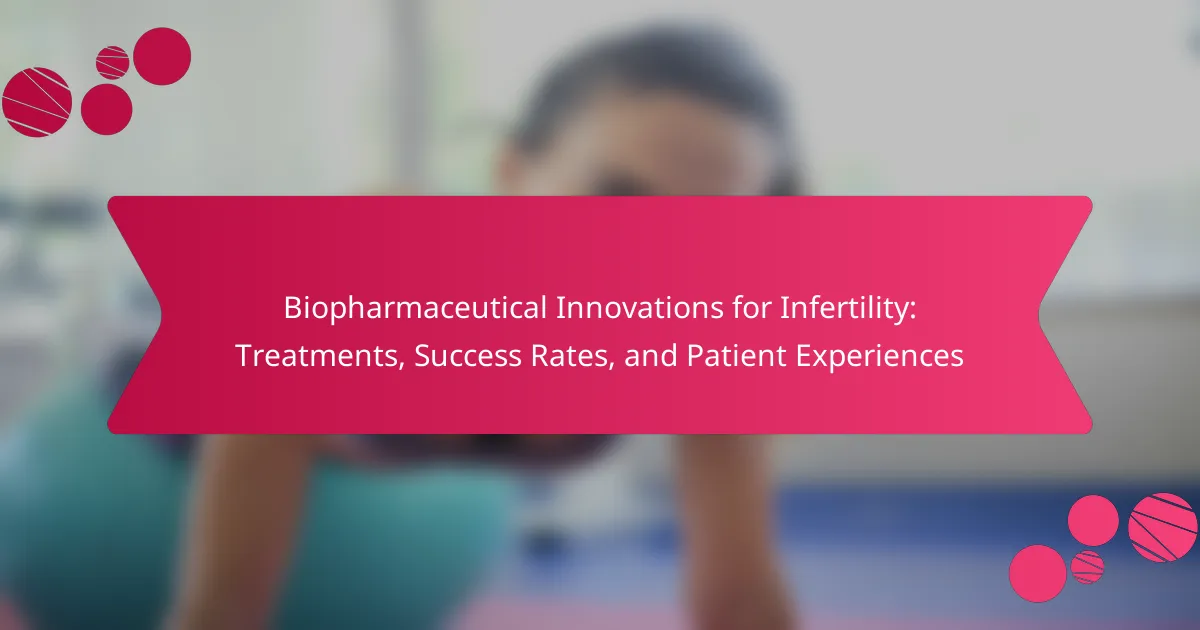Biopharmaceutical innovations are transforming infertility treatments, offering advanced hormonal therapies and genetic testing to enhance success rates. Patient experiences are improved through personalized medicine approaches that tailor treatments to individual needs. Understanding success rates influenced by age and health conditions is crucial for informed decision-making. This article explores the latest advancements, patient feedback, and emerging trends in biopharmaceutical infertility solutions.

What are the latest biopharmaceutical innovations for infertility treatment?
Recent biopharmaceutical innovations for infertility treatment include advanced hormonal therapies, genetic testing, and personalized medicine approaches. These innovations enhance success rates and improve patient experiences. For instance, new medications target specific hormonal imbalances, increasing the likelihood of successful conception. Genetic testing allows for the identification of potential hereditary issues, guiding treatment options. Additionally, personalized medicine tailors treatments to individual patient profiles, optimizing outcomes. These advancements reflect a significant shift towards more effective and patient-centric infertility solutions.
How do these innovations improve treatment outcomes?
Biopharmaceutical innovations significantly enhance treatment outcomes for infertility by improving success rates and patient experiences. Advanced therapies, such as personalized medicine and targeted drug delivery, increase the effectiveness of treatments. For instance, the development of novel hormone therapies has led to higher ovulation rates, improving chances of conception. Additionally, enhanced monitoring technologies provide real-time data, allowing for timely adjustments in treatment protocols. These innovations not only boost clinical success but also empower patients through better-informed decisions and improved emotional support during their journey.
Which biopharmaceuticals are most commonly used in infertility treatments?
The most commonly used biopharmaceuticals in infertility treatments include gonadotropins, clomiphene citrate, and recombinant follicle-stimulating hormone (rFSH). Gonadotropins stimulate ovarian function, while clomiphene citrate enhances ovulation. rFSH is vital for controlled ovarian stimulation. These treatments significantly improve success rates in assisted reproductive technologies.

What factors influence the success rates of biopharmaceutical infertility treatments?
Success rates of biopharmaceutical infertility treatments are influenced by patient age, underlying health conditions, treatment protocols, and laboratory techniques. Younger patients often experience higher success rates due to better egg quality. Additionally, factors like hormone levels and genetic health can significantly impact treatment outcomes. Advanced laboratory techniques, such as preimplantation genetic testing, enhance selection of viable embryos, further improving success rates.
How do patient demographics affect treatment success?
Patient demographics significantly influence treatment success in infertility. Factors such as age, ethnicity, and medical history shape response rates to biopharmaceutical innovations. Younger patients generally have higher success rates due to better ovarian reserve. Ethnic variations can affect genetic predispositions and treatment responses. Additionally, underlying health conditions may complicate treatment efficacy. Understanding these demographics allows for tailored approaches, enhancing overall treatment outcomes.
What role does the type of infertility play in treatment effectiveness?
The type of infertility significantly influences treatment effectiveness. Different infertility causes, such as hormonal imbalances or structural issues, require tailored biopharmaceutical approaches. For instance, hormonal treatments may have higher success rates for ovulatory disorders compared to surgical interventions for anatomical problems. Studies show that personalized treatment plans based on infertility type lead to improved outcomes, highlighting the importance of accurate diagnosis and targeted therapy.

What unique attributes distinguish specific biopharmaceutical treatments for infertility?
Biopharmaceutical treatments for infertility are distinguished by their unique mechanisms of action, targeted delivery methods, and personalized patient approaches. These innovations include monoclonal antibodies that modulate immune responses and hormonal therapies that precisely regulate reproductive hormones. Success rates vary significantly; for instance, some treatments report up to 60% success in specific patient demographics. Patient experiences highlight the reduced side effects and improved emotional support associated with these advanced therapies.
How do personalized treatment plans enhance patient outcomes?
Personalized treatment plans significantly enhance patient outcomes by tailoring interventions to individual needs. These plans consider unique medical histories, genetic factors, and lifestyle choices, leading to more effective treatment strategies. Studies indicate that personalized approaches can improve success rates in biopharmaceutical treatments for infertility. For instance, patients who receive customized protocols often report higher satisfaction and better emotional well-being. This individualized care fosters trust between patients and healthcare providers, ultimately leading to improved adherence to treatment regimens.
What are the innovative delivery methods for biopharmaceuticals?
Innovative delivery methods for biopharmaceuticals include targeted drug delivery systems, microneedle patches, and nanoparticle carriers. These methods enhance efficacy and minimize side effects, especially in infertility treatments. Microneedles provide painless administration, while nanoparticles can improve drug stability and release profiles. Targeted systems ensure that medications reach specific tissues, increasing success rates in treatment.

What are the patient experiences with biopharmaceutical infertility treatments?
Patient experiences with biopharmaceutical infertility treatments vary widely, with many reporting positive outcomes. Success rates are often linked to specific treatments, such as hormonal therapies and advanced reproductive technologies. Patients frequently highlight the emotional support received during treatment as a significant factor in their overall experience. Some report challenges related to side effects and the financial burden of treatments, impacting their satisfaction. Overall, the combination of innovative treatments and supportive care shapes patient perceptions and outcomes in infertility management.
How do patients perceive the effectiveness of these treatments?
Patients generally perceive biopharmaceutical treatments for infertility as effective due to their advanced methodologies and higher success rates. Many report positive experiences, noting improved emotional well-being and satisfaction with treatment outcomes. Clinical studies indicate that these innovations can lead to increased pregnancy rates, often surpassing traditional methods. Patient testimonials frequently highlight the personalized care and support received throughout the treatment journey, enhancing their overall perception of effectiveness.
What challenges do patients face during treatment?
Patients face several challenges during infertility treatment, including emotional stress, financial burdens, and physical side effects. Emotional challenges often stem from the uncertainty of success and the stigma associated with infertility. Financial constraints can arise from the high costs of treatments, which may not be fully covered by insurance. Physical side effects from medications can lead to discomfort and complications. Additionally, patients may experience social pressures and relationship strains as they navigate their treatment journey.

What are the common side effects associated with biopharmaceutical infertility treatments?
Common side effects of biopharmaceutical infertility treatments include hormonal fluctuations, gastrointestinal issues, and mood changes. Patients may also experience headaches, fatigue, and injection site reactions. These side effects vary based on the specific treatment protocol. Understanding these effects helps manage expectations during the treatment process.
How do side effects impact patient adherence to treatment?
Side effects can significantly reduce patient adherence to infertility treatments. Many patients experience anxiety over potential side effects, which can lead to discontinuation of therapy. A study found that approximately 30% of patients reported side effects as a primary reason for stopping treatment.
Moreover, the severity and type of side effects influence patient experiences and perceptions of treatment efficacy. For example, hormonal treatments may cause mood swings or weight gain, impacting overall satisfaction. As a result, addressing side effects through patient education and supportive care can enhance adherence rates and improve treatment outcomes.

What are the emerging trends in biopharmaceutical infertility research?
Emerging trends in biopharmaceutical infertility research focus on personalized treatments, advanced gene editing, and improved success rates. These innovations enhance patient experiences and outcomes.
Recent advancements include the use of CRISPR technology, which allows precise genetic modifications to address infertility issues. Additionally, new hormone therapies are showing promise in regulating reproductive health more effectively.
Patient-centered approaches are gaining traction, emphasizing the importance of mental health support and individualized care plans. This trend is reflected in increasing clinical trials that incorporate patient feedback into treatment protocols.
Lastly, telemedicine is becoming a vital tool, providing access to specialists and support networks for patients, thus improving overall treatment accessibility and convenience.
How is technology shaping the future of infertility treatments?
Biopharmaceutical innovations are transforming infertility treatments by enhancing success rates and improving patient experiences. Recent advancements include personalized hormone therapies and innovative embryo selection techniques. For instance, preimplantation genetic testing increases the likelihood of successful pregnancies by identifying viable embryos. Additionally, new medications target underlying hormonal imbalances, leading to higher success rates in assisted reproductive technologies. These developments not only improve outcomes but also provide patients with more tailored treatment options, fostering a more positive experience in their fertility journeys.
Which clinical trials are currently underway?
Several clinical trials focused on biopharmaceutical innovations for infertility are currently underway. These trials investigate new treatment methods, assess success rates, and gather patient experiences to enhance reproductive health outcomes. Notable studies include those exploring novel hormonal therapies and advanced reproductive technologies.

What best practices should patients follow when considering biopharmaceutical infertility treatments?
Patients considering biopharmaceutical infertility treatments should prioritize informed decision-making and thorough research. First, consult with a reproductive specialist to understand treatment options and success rates. Gather information on the specific biopharmaceuticals available, including their mechanisms and side effects. Evaluate personal health factors that may influence treatment effectiveness, such as age and medical history. Engage in discussions with other patients or support groups to gain insights into their experiences. Lastly, consider the financial aspects, including insurance coverage and potential out-of-pocket costs, to ensure a sustainable treatment plan.
How can patients prepare for consultations with healthcare providers?
Patients can prepare for consultations with healthcare providers by gathering relevant medical history and questions. Compile a list of medications, treatment experiences, and any fertility-related tests. Understanding biopharmaceutical innovations for infertility, such as their success rates and patient experiences, can enhance discussions. This preparation enables patients to engage effectively and make informed decisions about their treatment options.
What questions should patients ask regarding their treatment options?
Patients should ask about the specific treatment options available, their success rates, and potential side effects. Inquire about the duration of treatment and any necessary lifestyle changes. Understanding the costs and insurance coverage is also essential. Additionally, ask about the clinic’s experience with similar cases and support services offered. This information helps patients make informed decisions regarding their infertility treatments.
